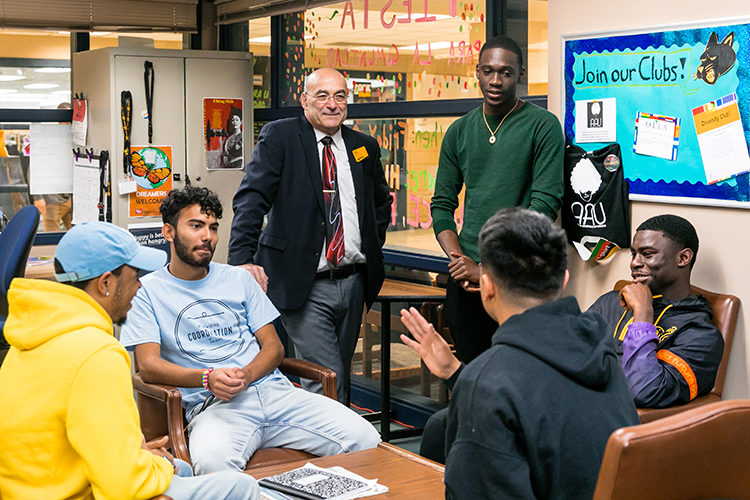Simon Bronner brought an unusual background and combination of skills to his position as dean of UWM’s College of General Studies: He is both a scholar of folklore and an expert on organizational development and leadership.
Before joining UWM, Bronner was a distinguished professor of American studies and folklore at the Pennsylvania State University. Drawing on his interest in organizational development, he had also consulted with universities around the world on how changing cultures and technologies are affecting education.
He’s now spent the last six months immersed in learning about the two campuses — UWM at Waukesha and UWM at Washington County — that provide the core courses for the College of General Studies.
Bronner, who grew up in New York, did graduate work at Indiana University and taught and researched previously in the Midwest and abroad, has enjoyed getting to know southeastern Wisconsin.
“I’m learning more about the diversity of the region,” he said. “Within a relatively small area, there’s a great deal of landscape difference as you drive between West Bend, Waukesha and Milwaukee. There are any number of ethnic differences in communities that are very fascinating and culturally rich.”
Facing challenges
As someone who writes about and participates in sports, he also fits right into Wisconsin’s sports and outdoor culture in what spare time he has.
Bronner is looking forward to addressing the challenges facing the new college and the two campuses.
One is transportation to and from the commuter campuses.
“That has particularly been an issue from Milwaukee to here (Waukesha), which doesn’t seem that far, but there’s not a direct way if you don’t have a vehicle.”
He’s heard of students who take as many as many as five buses and several hours to get to campus. “They really want their education, and they think we’re offering something valuable.” Bronner recognizes working on the complex issue of transportation will involve time and regional collaboration among the city, counties, and regional transportation agencies, he added.
Keys to attracting students
Finding ways to meet student needs and increase enrollment is also a challenge for the College of General Studies, as it is for many other schools and colleges. Keeping up with ever-changing technology and enhancing the individualized attention that is a feature of the smaller campuses are keys to attracting students, Bronner said.
“It’s not just a matter of small classes — which are a feature here and an important one — but I would say that the faculty as a whole are committed to personal attention and guidance and mentoring even outside the classroom.”
“I’m working on getting to know all the students. I’m not a dean who hides in an office,” Bronner said.
He’s also focusing on recognizing the diversity of the smaller campuses, working with student organizations to highlight celebrations of culture and heritage. “I’m aware of the perception that outside of Milwaukee you stop having diversity. That’s not true.”
First-generation college student
Having come from a family of immigrants and being a first-generation college graduate himself, Bronner is very interested in helping students learn to thrive in a multicultural society.
“We came here from an East European and Middle Eastern background, and part of my learning process was getting accustomed to the culture as well as the language.” He spoke Yiddish and Hebrew before learning English and picked up Japanese as a Fulbright professor. “I surprised a student one day by greeting her in Japanese,” he recalled with a smile.
After starting college as a political science major, he took a “life-changing course” on folklore at Binghamton University from Professor W.F.H. Nicolaisen, who became a mentor and inspired him to a new direction. “I took it because I’d heard about folk music and customs, but I didn’t know this could be a discipline and a career, or the extent of traditional knowledge in architecture, art, and literature.”
He is the author or editor of more than 40 books on folklore and folklife, cultural history, and ethnology, including several published in 2019. He also enjoys folk music and plays several instruments himself.
Rethinking missions
Bronner’s background in organizational development was a factor in his decision to come to UWM.
“Before I came here, I was a consultant to a lot of different kinds of institutions that are also rethinking their missions, rethinking how they do things.” The direction of education has changed fundamentally with the advent of the digital age, he said.
“Back when I was in school, students got credentials and then went out and worked using information from the past in their jobs. I think now we’re teaching students how to learn, how to get information with the knowledge that some jobs may become obsolete. They need the skill set to adjust, adapt — learn from the past and be prepared to engage the future.”
He’s done some informal work as a “unwitting researcher-parent.” He and his wife, Sally Jo, an educator, have two children in college. So he’s traveled with his son and daughter on school visits as they searched for an educational setting that fit their unique needs. One ended up at a small liberal arts school and the other is at Penn State, a much larger institution.
“I can talk to them frankly about their experiences and get their perspectives on student social as well as academic success in college.”
Learning employment needs
He’s engaged in learning about the employment needs in the growing Waukesha and West Bend areas and thinking through how the College of General Studies can help prepare students, not just for jobs, but to become a “thinking workforce.”
While he credits his education as the key to success, he agrees with Chancellor Mark Mone’s concerns about student debt and other challenges students face that require new approaches. “We need to be thinking about alternative ways of delivering education.”
Not every student knows what she or he wants to major in or what job they want when they start college, he said. “There’s a lot of pressure on 17- and 18-year-olds to decide what they want to do for the rest of their lives.”
The smaller campuses that are part of the College of General Studies — with their mixture of core and pre-professional courses and opportunity to transfer to a larger institution like UWM — are a great alternative for those students who want personal attention in their transition, Bronner said.
“I think the campuses are very good places for those who are undecided or want to explore,” Bronner said. “They can talk to people about what kinds of careers and opportunities they have. Sometimes they just want to go at their own pace. I think the campuses here are well set up to do that.”







